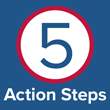

This fact sheet presents five steps for helping someone having thoughts of suicide: Ask, Be There, Help Keep Them Safe, Help Them Connect, and Follow Up.
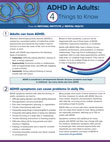
This fact sheet provides information about attention-deficit/hyperactivity disorder (ADHD) in adults including symptoms, how it is diagnosed, treatment options, and resources to find help.
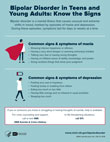
This infographic presents common signs and symptoms of bipolar disorder in teens and young adults.
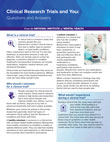
This fact sheet discusses what a clinical trial is, who should volunteer, why people might take part in a clinical trial, potential risks and benefits of participation, safety and ethical guidelines, and what people might experience during a clinical trial.
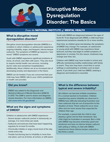
This fact sheet provides information about disruptive mood dysregulation disorder including a description of the condition, signs and symptoms, how it is diagnosed, treatment options, and tips for parents and caregivers.
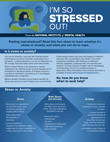
This fact sheet is intended for teens and young adults and presents information about stress, anxiety, and ways to cope when feeling overwhelmed.
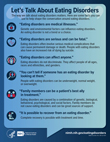
This infographic presents facts that can help shape conversations around eating disorders.

This fact sheet provides information on how you can look at your family health history and your genes to determine your risk of developing a mental disorder.
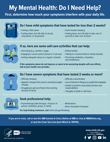
This fact sheet presents information about how to assess your mental health and determine if you need help. It provides examples of mild and severe symptoms, as well as self-care activities and options for professional help.

Information about the causes, signs and symptoms, diagnosis, and treatment of Pediatric Autoimmune Neuropsychiatric Disorders Associated with Streptococcal Infections (PANDAS).
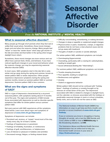
This fact sheet provides information about seasonal affective disorder (SAD), a type of depression. It includes a description of SAD, signs and symptoms, how SAD is diagnosed, causes, and treatment options.
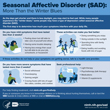
This infographic provides information about how to recognize the symptoms of seasonal affective disorder (SAD) and what to do to get help.
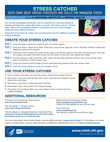
The Stress Catcher is a printable, “fortune teller” craft for children that offers coping strategies to help manage stress and other difficult emotions. Instructions on how to create and use the Stress Catcher are provided.

This fact sheet provides an overview of the NIMH Strategic Plan for Research including the Institute’s vision and mission, research goals, and cross-cutting research themes.
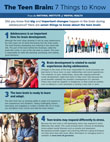
Learn about how the teen brain grows, matures, and adapts to the world.
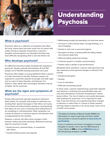
This fact sheet presents information on psychosis including causes, signs and symptoms, treatment, and resources for help.
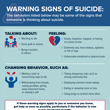 unbearable emotional or physical pain. 3) Changing behavior, such as making a plan or researching ways to die,ithdrawing from friends, saying good bye, giving away important items, or making a will; taking dangerous risks such as driving extr" />
unbearable emotional or physical pain. 3) Changing behavior, such as making a plan or researching ways to die,ithdrawing from friends, saying good bye, giving away important items, or making a will; taking dangerous risks such as driving extr" />
This infographic presents behaviors and feelings that may be warning signs that someone is thinking about suicide.
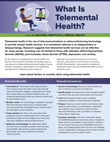
This fact sheet provides information about telemental health services including potential benefits and drawbacks of this kind of care, and factors to consider when looking for a provider.